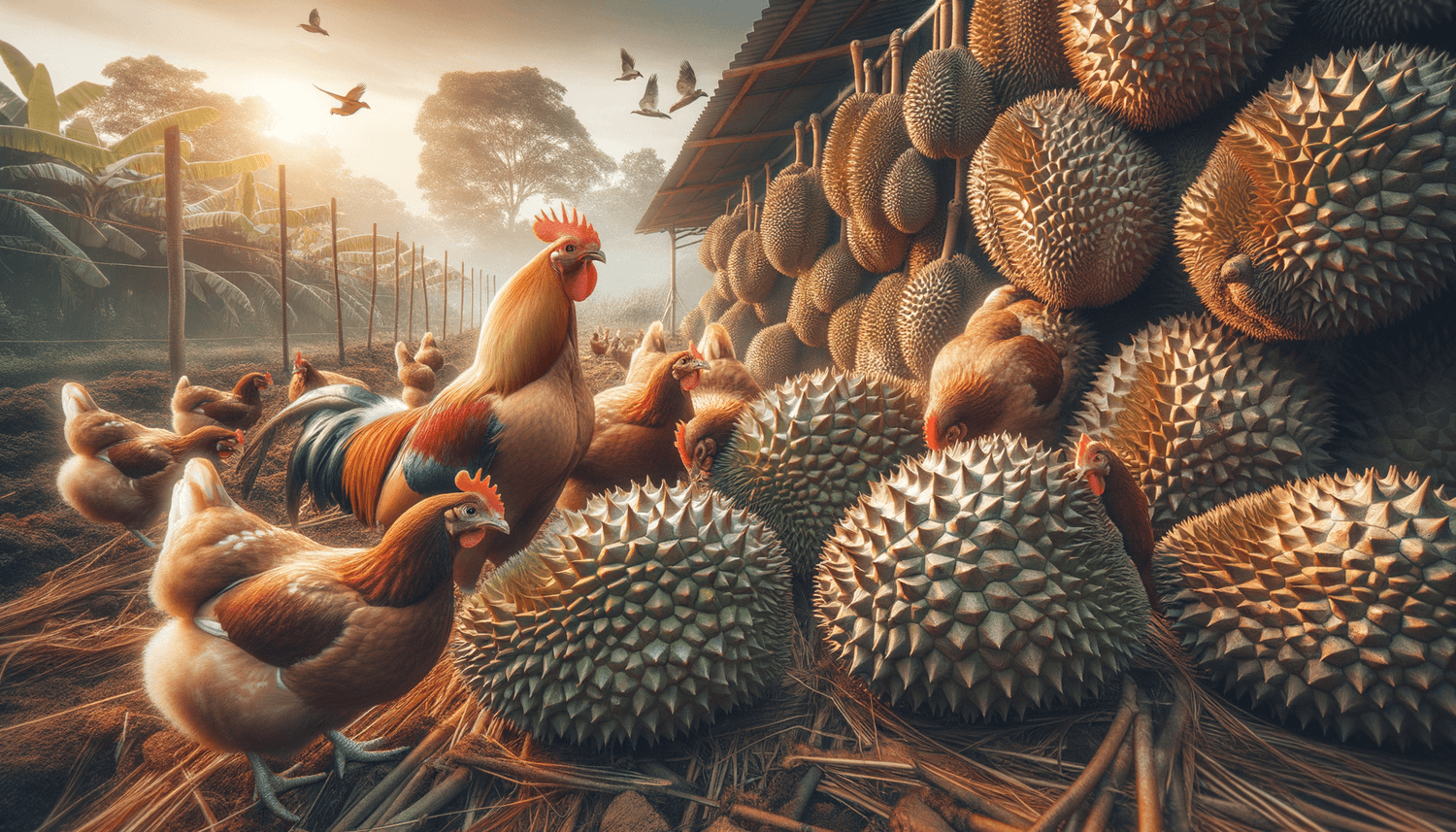Attention backyard chicken enthusiasts! We’ve all wondered about the diverse menu options our feathery friends can indulge in, but have you ever considered the wildly fragrant, distinctively delicious durian? In this blog post, we’re going to investigate the great durian dilemma: can our voracious cluckers chow down on this spiky, exotic treat? Keep reading as we delve into the world of chickens and durians, exploring benefits, risks, and nutritional value as well as offering up tips on how to prepare this unique food for your egg-laying companions. Stick around – this is going to be egg-citing!
Can chickens eat durians?
Yes, chickens can eat durians, but it is important to exercise caution. Durians can be safe for chickens in moderation, as their high nutritional value provides a beneficial boost to the diet. However, due to the sugar content, overfeeding durians can lead to obesity and related health issues. So, offering durians as an occasional treat is the key for safely incorporating this exotic fruit into your chickens’ diet.
A balanced diet for happy, healthy chickens
Just like humans, chickens need a balanced diet to stay happy and healthy. Meeting their dietary requirements ensures that they grow properly, produce higher quality eggs, and have a strong immune system. A chicken’s diet should primarily consist of high-quality chicken feed, which ideally should make up around 80-90% of their total intake.
Chicken feed is specially formulated to provide all the essential nutrients that chickens need, including proteins, carbohydrates, fats, vitamins, and minerals. Therefore, making it the centerpiece of their diet is crucial for their well-being. However, this doesn’t mean that our backyard friends cannot enjoy some variety. The remaining 10-20% of a chicken’s diet can consist of treats like fruits and vegetables, adding some excitement to their mealtime and keeping them content.
Nutritional value of durians for chickens.
Feeding durians to chickens offers a variety of nutritional benefits that can contribute positively to their overall health. Durians are an excellent source of vitamins and minerals, including vitamin C, potassium, and manganese. Vitamin C plays a crucial role in maintaining a robust immune system in chickens, while potassium helps in maintaining fluid balance, as well as muscle and nerve function. Manganese is essential for bone development and overall growth.
Additionally, durians contain dietary fiber, which can contribute to better digestion and gut health in chickens. The high water content of this tropical fruit helps to keep chickens hydrated, particularly on hot summer days. Durians are also packed with antioxidants, which offer multiple health benefits to chickens, such as supporting good vision and ensuring a higher level of egg production.
Despite these nutritional benefits, it is crucial to offer durians to chickens in moderation. Too much sugar (found in durians) can lead to obesity and other health complications in chickens. Therefore, while chickens can safely eat durians, they should only be provided as an occasional treat to ensure that their intake remains well-balanced and appropriate for maintaining optimal health.
Nutrition table of durians for chickens.
| Information | Description |
|---|---|
| Nutritional Value | High in vitamins (e.g., vitamin C), minerals (e.g., potassium, manganese), dietary fiber, and antioxidants |
| Suggested Serving Size | Small amounts occasionally, making up no more than 10-20% of their total diet |
| Safe Feeding Practices | Feed durians in moderation to prevent obesity and related health issues |
| Preparation | Remove the spikey skin and offer the soft fruit flesh to chickens |
| Potential Risks | Overfeeding can lead to obesity and other health complications |
| Hydration | High water content helps to keep chickens hydrated |
| Digestion | Dietary fiber supports better digestion and gut health |
| Seasonal Availability | Typically available from June to August, depending on the region |
| Other Benefits | Supports a robust immune system, maintains fluid balance, promotes bone development, and contributes to egg production |
Preparing durians for your chickens
Before serving durians to your chickens, it’s essential to remove the outer spiky skin and offer only the soft, edible fruit flesh. To do this, cut the durian into halves or smaller sections, depending on the number of chickens you’re feeding. Next, carefully scoop out the flesh using a spoon or your hands. This way, you can ensure the chickens safely enjoy their treat without risking injury from the tough outer shell.
Alternative treats to consider
If you’re looking for other fruit and vegetable treats to offer your chickens, there are many options available. Some popular choices include apples, berries, melons, grapes, bananas, and leafy greens. These fruits and vegetables are not only rich in vitamins and minerals but also help to add variety and excitement to your chickens’ diets. Always remember to introduce new treats gradually, so your chickens can adjust to the different tastes and textures.
Monitoring your chickens’ health
As you add durians or any other treats to your chickens’ diets, it’s crucial to closely monitor their health, happiness, and egg production. Keep an eye out for changes in their behavior, appetite, and appearance. If you notice any issues, it could be a sign that adjustments to their diet are needed. By getting to know your chickens and understanding their needs, you’ll be able to provide the best care for your backyard flock.
In conclusion, durians can be a nutritious and exciting treat for your chickens when fed in moderation. By following the suggested serving size and safe feeding practices, your flock can enjoy this unusual fruit while maintaining a balanced diet. So go ahead and treat your feathery friends to some durian delight, but remember, a healthy chicken is a happy chicken!

















